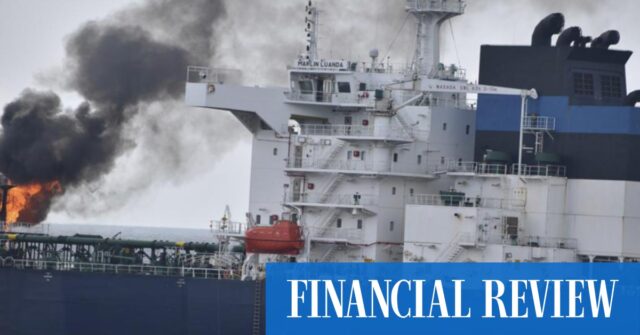The lawyer, who asked not to be identified, said charterers were concerned end-customers might refuse to pay for cargo delivered late. He said those charterers had warned the shipowners they might seek damages for late delivery of diverted goods.
In the most serious attack so far, on January 26 a missile struck the oil products tanker Marlin Luanda carrying products for commodities trader Trafigura, starting a fire that took the crew and naval vessels around 19 hours to extinguish.
Container ships mostly carry manufactured and semi-finished goods, in steel boxes, while dry bulk vessels carry bulk commodities unboxed in large holds. Owners of dry bulk ships are often small companies with little market power.
Figures from Clarksons, the London-based shipping services company, show that in the week to January 28, average daily arrivals of dry bulk vessels around the mouth of the Red Sea were down by 45 per cent on the numbers in early December. For container ships, the figure was 91 per cent.
Some market participants said they had not encountered problems in cases where shipowners said they might divert cargoes.
However, Mr Bodouroglou said “a number of charterers” had asked his members to remove the wartime clause from charter contracts to ensure the shipping companies had no right to divert away from the Suez Canal. So far, he did not know of any member to have agreed to do so, he said.
“It’s a huge risk for an owner to agree to that. What is he going to do if there’s active war, which would create risks for all the ships? His liability will be huge,” he said.
Mr Bodouroglou said that in decades in shipping he had never received such requests before the current crisis. He said he would assess conditions before sending any further vessels into the area. Even though Mr Bodouroglou continues to send some ships via the canal, he said it would be unwise to surrender the option of diverting.
The maritime lawyer said charterers were resisting owners’ attempts to avoid the Suez Canal route.
“You have a situation where the cost to a trader of going around the Cape is not just the additional cost of going round, but he has lost his trade,” the lawyer said. “He needs to find another buyer who perhaps will not pay as good a price.”
One shipping executive – John Wobensmith, chief executive of New York-based dry bulk company Genco Shipping — said he had not had any push back from charterers on diverting his vessels. However, he suggested that some smaller charterers might be less sophisticated.
A Genco ship, the Genco Picardy, was hit by a Houthi drone on January 17. The vessel was one of two Genco ships that were already in the Red Sea in December when the company decided to start avoiding the area. The other left safely.
Financial Times




